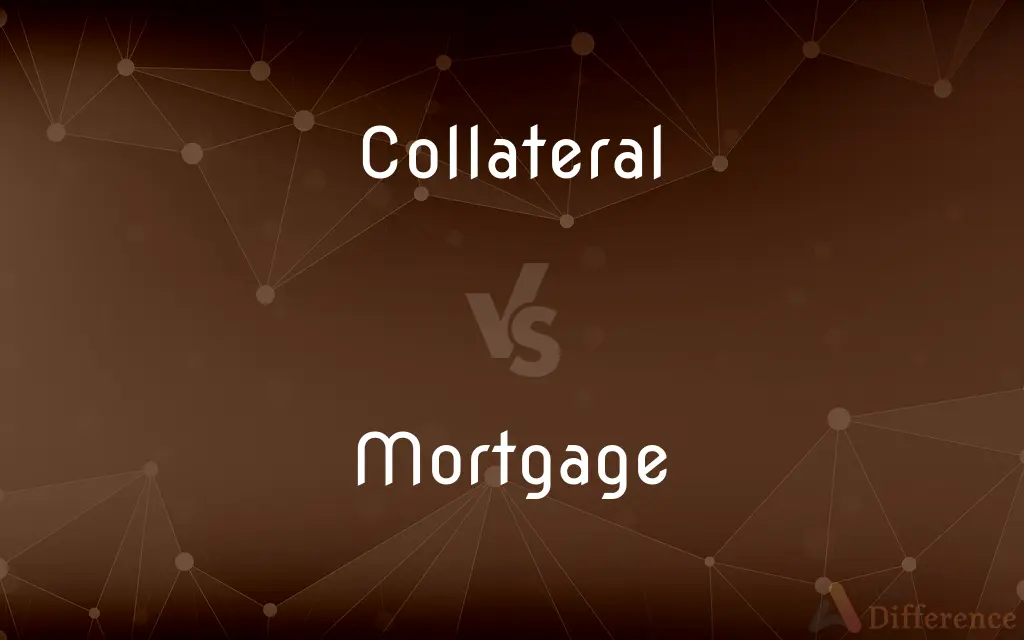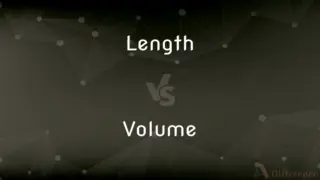Collateral vs. Mortgage — What's the Difference?
By Maham Liaqat & Urooj Arif — Updated on March 24, 2024
Collateral is an asset pledged as security for a loan, while a mortgage is a loan specifically secured by real property.

Difference Between Collateral and Mortgage
Table of Contents
ADVERTISEMENT
Key Differences
Collateral and mortgage are key concepts in finance, particularly in lending and borrowing. Collateral refers to any asset that a borrower offers to a lender as security for a loan. It can be real property, vehicles, stocks, or any valuable asset. The primary purpose of collateral is to minimize the risk for the lender; if the borrower defaults on the loan, the lender has the right to seize the collateral to recover the loan amount. On the other hand, a mortgage is a specific type of loan used to purchase real estate. In a mortgage, the real estate itself serves as collateral for the loan. If the borrower fails to make the agreed payments, the lender can foreclose on the property to recover their funds.
One of the main differences between these two concepts is the scope of their application. Collateral can be any asset deemed valuable by the lender and can secure various types of loans, not just those for purchasing property. Mortgages, however, are exclusively tied to real estate transactions. They are designed specifically for financing the purchase of property, with the property itself automatically becoming the collateral.
The terms and conditions associated with collateral and mortgages also differ. For collateral, the terms depend on the loan type and the asset's value. For a mortgage, the terms are more standardized, often involving a down payment, a fixed or variable interest rate, and a repayment period usually spanning several years. Mortgages also come with specific legal requirements and procedures, including registration of the lien on the property to publicly declare the lender's interest in it.
The process of seizing the collateral in case of loan default also varies. For general collateral, the lender's ability to take possession of the asset and the process involved can vary widely based on the loan agreement and local laws. In contrast, a mortgage default triggers a specific legal process known as foreclosure, which involves the sale of the property under court supervision to ensure the debt is recovered as much as possible.
Despite these differences, both collateral and mortgages serve the fundamental purpose of reducing lending risk. By providing an asset as security, borrowers can often access larger loan amounts or more favorable terms than they would without collateral. Similarly, mortgages make purchasing real estate accessible for individuals and businesses by allowing them to pay over time, rather than requiring the full amount upfront.
ADVERTISEMENT
Comparison Chart
Definition
An asset pledged as security for a loan.
A loan secured specifically by real property.
Scope
Can secure various types of loans.
Specifically for real estate purchases.
Types of Assets
Real property, vehicles, stocks, etc.
Real estate only.
Purpose
To minimize lending risk.
To finance the purchase of real estate.
Legal Process
Varies by loan type and local laws.
Involves specific procedures like foreclosure.
Repayment Terms
Depends on the loan agreement.
Often involves down payments, interest rates, and fixed repayment periods.
Compare with Definitions
Collateral
The asset that a lender can seize if a loan is not repaid.
If the business loan is not repaid, the equipment serves as collateral.
Mortgage
The legal agreement by which a bank or creditor lends money at interest.
The mortgage required monthly payments of $1,500.
Collateral
An asset that a borrower offers to a lender to secure a loan.
She offered her car as collateral for a personal loan.
Mortgage
A claim against property created by borrowing money.
The property had a $200,000 mortgage against it.
Collateral
A borrower's pledge of specific property to a lender, to secure repayment.
To secure the loan, he used his vintage watch collection as collateral.
Mortgage
The process of pledging real property to secure a loan.
Obtaining a mortgage involved a comprehensive credit check.
Collateral
Security provided to ensure the repayment of a debt.
The bank required additional collateral because of the loan's size.
Mortgage
The conveyance of title as security for the repayment of a loan.
The mortgage on the house will be paid off in 15 years.
Collateral
Any valuable asset accepted by lenders to protect against loan default.
Stocks and bonds can also be used as collateral.
Mortgage
A loan obtained for the purpose of buying real estate, secured by the property itself.
They took out a 30-year mortgage to buy their first home.
Collateral
Something pledged as security for repayment of a loan, to be forfeited in the event of a default
She put her house up as collateral for the bank loan
Mortgage
A legal agreement by which a bank, building society, etc. lends money at interest in exchange for taking title of the debtor's property, with the condition that the conveyance of title becomes void upon the payment of the debt
I put down a hundred thousand in cash and took out a mortgage for the rest
Collateral
A person having the same ancestor as another but through a different line.
Mortgage
Convey (a property) to a creditor as security on a loan
The estate was mortgaged up to the hilt
A heavily mortgaged farm
Collateral
Additional but subordinate; secondary
The collateral meanings of a word
Mortgage
A loan for the purchase of real property, secured by a lien on the property.
Collateral
Descended from the same stock but by a different line
A collateral descendant of Robert Burns
Mortgage
The document specifying the terms and conditions of the repayment of such a loan.
Collateral
Situated side by side; parallel
Collateral veins
Mortgage
The repayment obligation associated with such a loan
A family who cannot afford their mortgage.
Collateral
Situated or running side by side; parallel.
Mortgage
The right to payment associated with such a loan
A bank that buys mortgages from originators.
Collateral
Coinciding in tendency or effect; concomitant or accompanying.
Mortgage
The lien on the property associated with such a loan.
Collateral
Serving to support or corroborate
Collateral evidence.
Mortgage
To pledge (real property) as the security for a loan.
Collateral
Of a secondary nature; subordinate
Collateral target damage from a bombing run.
Mortgage
To make subject to a claim or risk; pledge against a doubtful outcome
Mortgaged their political careers by taking an unpopular stand.
Collateral
Of, relating to, or guaranteed by a security pledged against the performance of an obligation
A collateral loan.
Mortgage
(legal) A special form of secured loan where the purpose of the loan must be specified to the lender, to purchase assets that must be fixed (not movable) property, such as a house or piece of farm land. The assets are registered as the legal property of the borrower but the lender can seize them and dispose of them if they are not satisfied with the manner in which the repayment of the loan is conducted by the borrower. Once the loan is fully repaid, the lender loses this right of seizure and the assets are then deemed to be unencumbered.
We're renting a property in the city centre because we can't afford to get a mortgage yet.
Collateral
Having an ancestor in common but descended from a different line.
Mortgage
(obsolete) State of being pledged.
Lands given in mortgage
Collateral
Property acceptable as security for a loan or other obligation.
Mortgage
To borrow against a property, to obtain a loan for another purpose by giving away the right of seizure to the lender over a fixed property such as a house or piece of land; to pledge a property in order to get a loan.
To mortgage a property, an estate, or a shop
We mortgaged our house in order to start a company.
Collateral
A collateral relative.
Mortgage
To pledge and make liable; to make subject to obligation; to achieve an immediate result by paying for it in the long term.
Collateral
Parallel, along the same vein, side by side.
Mortgage
A conveyance of property, upon condition, as security for the payment of a debt or the preformance of a duty, and to become void upon payment or performance according to the stipulated terms; also, the written instrument by which the conveyance is made.
Collateral
Corresponding; accompanying, concomitant.
Mortgage
State of being pledged; as, lands given in mortgage.
Collateral
Being aside from the main subject, target, or goal.
Although not a direct cause, the border skirmish was certainly a collateral incitement for the war.
Collateral damage
Mortgage
To grant or convey, as property, for the security of a debt, or other engagement, upon a condition that if the debt or engagement shall be discharged according to the contract, the conveyance shall be void, otherwise to become absolute, subject, however, to the right of redemption.
Collateral
(genealogy) Of an indirect ancestral relationship, as opposed to lineal descendency.
Uncles, aunts, cousins, nephews and nieces are collateral relatives.
Mortgage
Hence: To pledge, either literally or figuratively; to make subject to a claim or obligation.
Mortgaging their lives to covetise.
I myself an mortgaged to thy will.
Collateral
(finance) Relating to a collateral in the sense of an obligation or security.
Mortgage
A conditional conveyance of property as security for the repayment of a loan
Collateral
(finance) Expensive to the extent of being paid through a loan.
Mortgage
Put up as security or collateral
Collateral
Coming or directed along the side.
Collateral pressure
Collateral
Acting in an indirect way.
Collateral
Having the phloem and xylem adjacent.
Collateral
(finance) A security or guarantee (usually an asset) pledged for the repayment of a loan if one cannot procure enough funds to repay.
Collateral
A collateral (not linear) family member.
Collateral
(marketing) Printed materials or content of electronic media used to enhance sales of products (short form of collateral material).
Collateral
(archaic) A contemporary or rival.
Collateral
Coming from, being on, or directed toward, the side; as, collateral pressure.
Collateral
Acting in an indirect way.
If by direct or by collateral handThey find us touched, we will our kingdom give . . . To you in satisfaction.
Collateral
Related to, but not strictly a part of, the main thing or matter under consideration; hence, subordinate; not chief or principal; as, collateral interest; collateral issues.
That he [Attebury] was altogether in the wrong on the main question, and on all the collateral questions springing out of it, . . . is true.
Collateral
Tending toward the same conclusion or result as something else; additional; as, collateral evidence.
Yet the attempt may giveCollateral interest to this homely tale.
Collateral
Descending from the same stock or ancestor, but not in the same line or branch or one from the other; - opposed to lineal.
Collateral
A collateral relative.
Collateral
Collateral security; that which is pledged or deposited as collateral security.
Collateral
A security pledged for the repayment of a loan
Collateral
Descended from a common ancestor but through different lines;
Cousins are collateral relatives
An indirect descendant of the Stuarts
Collateral
Serving to support or corroborate;
Collateral evidence
Collateral
Accompaniment to something else;
Collateral target damage from a bombing run
Collateral
Situated or running side by side;
Collateral ridges of mountains
Common Curiosities
What is collateral?
Collateral is an asset offered by a borrower to secure a loan, which the lender can seize if the loan isn't repaid.
Can any asset be used as collateral?
Yes, any asset of value, including real estate, vehicles, or stocks, can be used as collateral, depending on the lender's requirements.
Are the terms for a mortgage fixed?
Mortgage terms, including the interest rate and repayment period, can be fixed or variable, depending on the agreement between the borrower and lender.
What legal rights does a lender have with collateral?
A lender has the right to seize and sell the collateral if the borrower defaults on the loan, subject to the terms of the loan agreement and local laws.
How does the foreclosure process work?
Foreclosure is a legal process where the lender seeks to recover the balance of a loan by forcing the sale of the asset used as collateral, typically through a judicial sale.
What happens if a mortgage isn't paid?
If a mortgage isn't paid, the lender can initiate foreclosure, a legal process to seize and sell the property to recover the loan amount.
Is a mortgage the only way to buy real estate?
While not the only way, mortgages are the most common method for individuals and businesses to finance real estate purchases, allowing payment over time.
What is a mortgage?
A mortgage is a type of loan specifically for purchasing real estate, with the property itself serving as collateral.
How does collateral reduce lending risk?
Collateral reduces lending risk by providing the lender with an asset to seize and sell if the borrower fails to repay the loan.
Can a property have more than one mortgage?
Yes, a property can have multiple mortgages, but each subsequent mortgage is subordinate to the first, meaning the primary mortgage must be satisfied before others.
Share Your Discovery

Previous Comparison
Music vs. Song
Next Comparison
Length vs. VolumeAuthor Spotlight
Written by
Maham LiaqatCo-written by
Urooj ArifUrooj is a skilled content writer at Ask Difference, known for her exceptional ability to simplify complex topics into engaging and informative content. With a passion for research and a flair for clear, concise writing, she consistently delivers articles that resonate with our diverse audience.















































